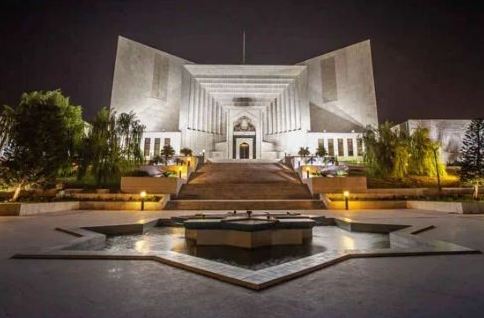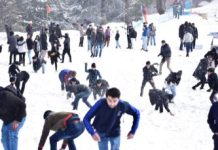SCBA, others seek directives for ECP to hold polls within 90 days; last hearing on military courts held in Aug
Special Correspondent
ISLAMABAD: The Supreme Court (SC) has fixed the hearing of petitions seeking general elections within 90 days and challenging military trials of civilians on October 23 (Monday).
A three-member bench, headed by Chief Justice of Pakistan (CJP) Qazi Faez Isa and comprising Justice Aminuddin Khan and Justice Athar Minallah, will take up petitions filed by the Supreme Court Bar Association and others seeking directives to hold general elections within 90 days as stipulated by the Constitution.
Meanwhile, a five-member special bench led by Justice Ijazul Ahsan, and comprising Justice Munib Akhtar, Justice Yahya Afridi, Justice Sayyed Mazahar Ali Akbar Naqvi and Justice Ayesha Malik will hear petitions challenging the trial of civilians in military courts.
Last August, the SCBA moved the top court to direct the Election Commission of Pakistan (ECP) to announce the date for polls within the constitutionally mandated period of 90 days following the dissolution of the lower house – National Assembly – on August 9.
The lawyers association also challenged the approval of digital census 2023 by the Council of Common Interests (CCI) on August 5.
The petition, a copy of which is available with The Express Tribune, was filed by SCBA members belonging to the Professional Lawyers body (Hamid Khan Group).
The election supervisor is bound to hold polls within 90 days if the assembly is dissolved early.
As the lower house was dissolved on August 9, three days before the end of its term, elections were supposed to be held by November 9. Yet, the last potential time for elections floated by the ECP is January 2024.
Meanwhile, after the approval of census 2023 by the CCI, a delay in the holding of polls seems to be in offing, as according to officials, the process of new delimitations may take four months or longer.
The SCBA, in its petition, urged the apex court to declare the participation of the caretaker chief ministers of Punjab and Khyber-Pakhtunkhwa in the CCI meeting as illegal and in violation of the Constitution.
Both the Punjab and Khyber-Pakhtunkhwa assemblies where the Pakistan Tehreek-e-Insaf (PTI) government was in power were dissolved in January 2022.
The caretaker governments in both the provinces were bound to hold elections within 90 days but failed to do so.
The petition maintained that the purpose of convening the CCI meeting a week before the dissolution of the National Assembly to approve the results of new census was to delay the elections and requested the apex court to suspend the notification in this regard.
The petition further noted that holding of elections within a period of 90 days of dissolution of assemblies is a salient feature of the Constitution and any delay in the conduct of general elections beyond the mandatory period of 90 days as mandated by Article 224(2) of the Constitution, 1973 will be in blatant violation of Articles 4, 5, 6, 9, 17, 51, 106 and 224 of the Constitution.
A number of petitions were filed before the SC challenging former Pakistan Democratic Movement’s coalition government and the military’s decision to hold military trials of civilians suspected of involvement in the protests that broke out on May 9, following ousted premier Imran Khan’s arrest from the premises of the Islamabad High Court by troops of the paramilitary forces.
Several military installations were targetted during the protest including Corps Commander Lahore’s residence – Jinnah House – and the General Headquarters (GHQ) in Rawalpindi.
The matter was taken up by former CJP Umar Ata Bandial and Justices Ijazul Ahsan, Munib Akhtar, Yahya Afridi, Sayyed Mazahar Ali Akbar and Ayesha Malik. On August 3, the apex court had adjourned the hearing indefinitely much to the dismay of petitioners who had sought expeditious disposal of their petitions.
During the proceedings thus far, the court has been informed that at least 102 suspects remain under army custody.
The petitioners contend that subjecting civilians to trials under the Army Act read with Official Secrets Act stands in violation of the Constitution and encroaches on fundamental rights of citizens. The lack of transparency in past trials conducted by military courts has also been highlighted.
At the last hearing, former CJP Bandial had remarked that the apex court would not allow the army to carry out any unconstitutional act, stressing that the military was meant to serve the country.
He had observed that the incidents of May 9 were of serious nature and that it pained him to hear remarks made by the attorney general of Pakistan (AGP) about the Pakistan Army being equipped to open fire on protestors on May 9.
The former CJP noted that the army was meant to serve the country.
Meanwhile AGP Mansoor Awan had assured the court that the 102 civilian suspects, still in military custody, would be treated fairly during the trial.
Awan said that his assurance came from the top military leadership, adding that concessions were being made for May 9 suspects on the court’s insistence. At one point, the AGP reminded the court that “the military is armed”.
“No efforts are being made to overturn the Constitution … What happened on May 9 is before everyone,” Awan told the court. “Remember one thing – they are the armed forces. If they are attacked, they have weapons to defend themselves.”
AGP Awan further said that the army was equipped to fire bullets. “It is not possible that if they are attacked [and] they first approach an SHO [police station house officer] to lodge a formal complaint,” he said.
“They [the military] could have opened fire on May 9,” the AGP added. However, this prompted Barrister Aitzaz Ahsan, one of the petitioners, to ask the AGP why the military did not open fire.
“We do not want that such a situation … when the army resorts to opening fire. This is why we are conducting [military] trials,” Awan said. Ahsan, then said that the government’s term ends on August 12, so “how can it give assurances then”.
At one point, Justice Akhtar had observed that the state could not deprive its citizens of their fundamental rights even if it wished to. He added that the trial of civilians in military courts was equivalent to running a parallel judicial system.












